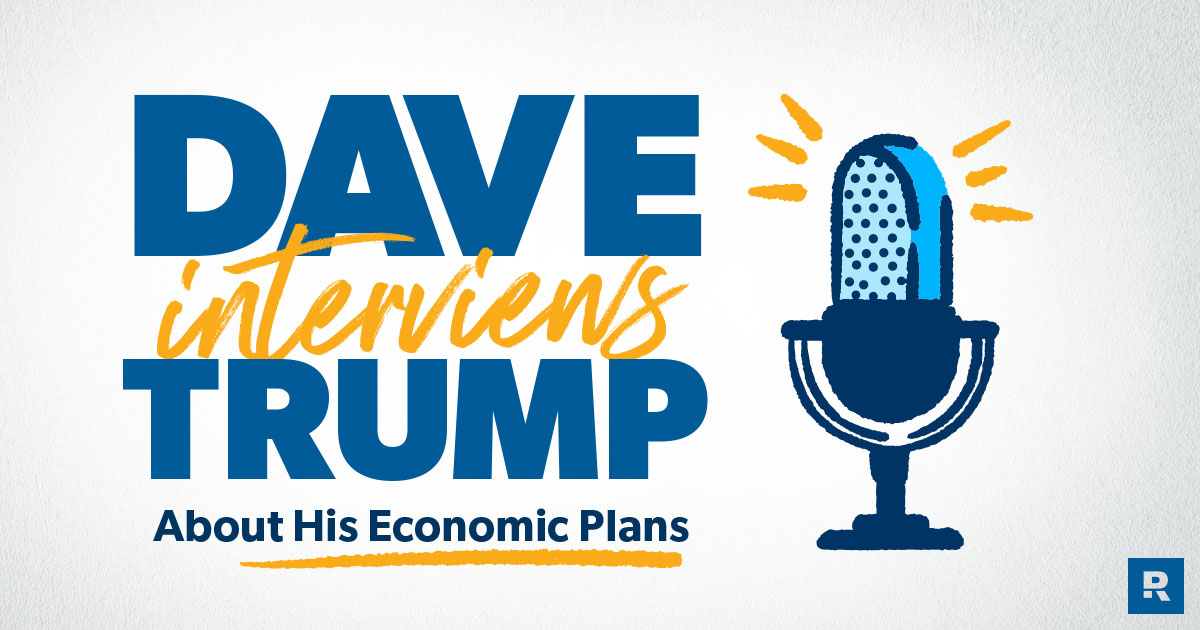This election season, economic issues top the list of voters’ concerns—no matter where they stand politically. Unfortunately, there’s been way more mudslinging so far in this election than any real discussion of the issues that are affecting people’s lives. If you’re sick of that, we’re right there with you. And we did something about it.
We reached out to both Vice President Kamala Harris’ campaign and former President Donald Trump’s campaign and invited each of the candidates to a one-on-one interview with Dave. The opportunity: Share your ideas for the economy and how you’ll make things better for the American people if you’re elected president.
Trump’s campaign was the first to accept, so Dave and our team headed to Trump Tower in New York City to take everyday Americans’ questions about the economy, small businesses and taxes to Trump in a real-talk interview. No spin. No hype. Just answers.
Inflation Is a Big Deal
Dave got to the heart of the issue with his first question. He explained that The Ramsey Show has millions of listeners who are concerned about $8 eggs, $5-a-gallon gas, 7% interest rates and homes they can’t afford because wages aren’t increasing as quickly as house prices.
“In the first 90 days, the strokes that you make to change the economy if you’re elected are a big deal,” Dave said. “What are some of the first things you’re going to do?”
Trump agreed inflation is a huge pain point, saying he believes the country has experienced the highest inflation in its history over the last few years. And his solution begins with lowering energy costs.
“The first thing you have to do is get the energy [costs] down,” Trump said. “If you get the energy down, other things are going to follow.
“I believe I’ll be able to get energy down to 50% of what it is now in a period of less than a year,” he said, adding that to reach this goal, he would remove regulations around oil drilling and fracking to take advantage of the oil reserves in America.
“If we do that, all those inflated prices are going to come down,” Trump said.
Heating Up the Economy
Dave and Trump next tackled the topic of taxes, specifically how tax cuts can spur small business and fuel economic growth.
“I’m a small-business guy,” Dave said. “If you lower my taxes, it doesn’t mean I put it in my pocket. It means I hire people. Talk about lowering taxes in the first year of your administration.”
“What we’re doing has sort of two phases,” Trump explained. In his first administration, Trump worked with Congress to lower the corporate tax rate from 39% to 21%. If he’s reelected, he plans to lower the rate again. “I’m bringing [the tax rate] from 21% to 15%, but you have to manufacture your product [in the United States].”
Dave pointed out that Presidents Ronald Reagan and Bill Clinton both used the strategy of lowering taxes to create government revenue through the resulting economic growth.
“And you saw it with me,” Trump agreed. “At 39% and then down to 21%, you’d think we’d do half or much less [revenue]. But in the first full year we did much more revenue in the United States than we did at 39%.”
The next phase of Trump’s plan involves placing tariffs—essentially an extra tax—on foreign goods sold in America that he believes will help American companies remain competitive.
Watch the Full Interview
These are just a couple of the highlights from Dave’s interview with Trump. You can watch the full interview for free on YouTube, Spotify, Apple Podcasts and in the Ramsey Network app.
But here’s the real takeaway: What happens in the White House will never be as important as what happens in your house. Sure, the president’s economic policy can create an environment that makes it easier or more difficult for you to reach your money goals. That’s why it’s good to know about their plans so you can make an informed decision. But it’s a waste of time to wait for a politician to save you. If you want to change your economic outlook, it’s up to you.
Need a place to start? Check out our free three-minute assessment that will show you where you stand and what steps to take next.



